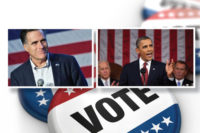Can you tell it’s an election year?
One evening early in March President Obama headed into the lion’s den to face-off with 90 CEOs of the BRT. The President and the execs agreed on one thing going in: jobs, jobs, jobs, we need more jobs.
Limits of cooperation
According to reports, the President was greeted with polite applause, followed by a lengthy silence as nearly 100 CEOs apparently sat on their hands during the President’s speech. After the speech the doors were closed in anticipation of an old-fashioned Three Stooges cream pie fight. The CEOs lobbed their complaints and recommendations. The President, being rather athletic, bobbed and ducked and emerged unsplattered.
Of course the Stooges weren’t present, but their classic pie throwing antics epitomize the hardcore partisanship in DC that some say stands at a historic all-time high.
The President told business leaders that the country needs to change its tax system to reward businesses that invest in the U.S., thereby creating jobs that remain on U.S. soil. The CEOs let the subject of taxes slide by without comment. But they tried to be helpful by drawing up a list of more than 60 different pending or proposed regulations that “may impose significant costs on the economy and unnecessary burdens on business,” according to the BRT. Burdens are job killers, such as OSHA’s now-dead idea of having employers document cases of musculoskeletal disorders. That was one of the 60 “barriers to growth.”
Burdens and barriers everywhere
It turns out that these burdens and barriers crop up in almost every corner of American living. From nutrition labels on vending machine food to behind-the-wheel and classroom training for commercial vehicle operators. From cargo screening to particulate matter we all breathe. From forest road systems (do they really have to be regulated by the Clean Water Act?) to streams being buffered from mining activity.
To the anti-reg crowd, or as they would say, the “pro-smart reg” crowd, the beastly bureaucratic burden is borne of a thousand barriers like these. Another name for the anti-reg groups is the “Good Enough” gang. Air quality is good enough. Food safety? Good enough. We don’t need more food inspections. Waste recycling protections, rewards for wellness program participation, lead-safe work practices, condition of underground storage tanks, emission controls of major stationary pollution sources, Internet commerce, how much silica dust workers can inhale — it’s all good enough. Leave ‘em alone. It’s all good.
No worries
According to the list of targeted regs and proposals, some of them voluntary, the country could do well by worrying less about the condition of industrial boilers; levels of dioxin, lead, silica, sulfur dioxide; childhood obesity; who qualifies for Family and Medical Leave; your caloric intake at restaurants as noted on menus; sham waste recycling; coal combustion residuals. Much leftist hand-wringing with so little value add.
Areas of concern
There are some things to worry about, according to the BRT. How EPA assesses chemical risk is a concern and potential job killer. Using crash data and inspections and violation history to assess the safety performance of a greater segment of the motor carrier industry is a worry. Expanded access to the Consumer Product Safety Commission complaint database apparently gives some CEOs nightmares of plaintiffs attorneys on the prowl. Damaged business reputations are job killers, too.
Bottom line, the CEOs say this is no time for regs that add costs and slow business expansion.
Balance of power
To balance things out, I’d like to see some think tank, non-government organization, or other group compile a list of 60 regs that would be good for the country’s health and well-being. Have it signed by 100 or so heavyweight scientists to counter the punch of the CEOs. Invite the President over to hear you out. Call out areas of sustainability, corporate transparency, air quality, water quality, food quality, homeland security that are not “good enough.” Make the case for evidence-based reg expansion.
Unfortunately, you would have two lists that wash each other out. Which is what we have in Washington today, a total wipeout of responsible leadership. You’d think the absence of true leaders might keep Main Street folks up at night. But they’ve gotten used to the idea, scary as that may be, and changed the channel. The true bottom line: apathy and disengagement are far more serious barriers and burdens to putting American back together again, compared to food labels and MSD columns.




